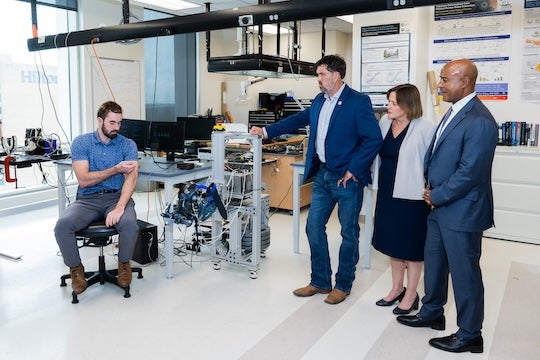Neuroscience experts from government, medicine, business and academia came together at Rice University’s Bioscience Research Collaborative (BRC) Aug. 27 to discuss the American “brain economy transition.” The role of the human brain in the wider economy is drawing increased attention, and brain capital is becoming a priority for business and individuals.
The Center for Health and Biosciences at Rice’s Baker Institute for Public Policy hosted the event to convene thought leaders and stakeholders from across the nation and globe to catalyze U.S.-led global advancements in areas such as technology and health care.
“We gather to address one of the most pressing issues of our time: the state of the American brain,” said Amy Dittmar, Rice’s Howard R. Hughes Provost and executive vice president for academic affairs, in her opening remarks. “Rice University is at the forefront today of the brain-positive economy transition. This transition is complex and will require a systems approach. Incremental change will not be sufficient, and there are few silver bullets.

“We aim to stop and reverse the loss of brain capital through pioneering efforts such as the Neuro-Policy Program. This program drives systems change by learning about ingredients for transformation, assessing barriers to be removed as well as catalyzing change with partners and coalitions vying for a new way forward. Today is a testament to the program’s success as we integrate new neuroscience-inspired policy approaches at multiple scales: at Rice University, the Texas Medical Center, in Houston, in Texas, at the federal level and globally.”
Earlier this year, Houston Methodist and Rice also launched the Center for Neural Systems Restoration. The center advances state-of-the-art care for neurological conditions by bringing together scientists, clinicians, engineers and surgeons to tackle medical challenges such as stroke recovery and spinal cord injury.
Dittmar explained that neurological research also includes mental health. Mental health inequities are projected to cost the United States $14 trillion by 2040, according to a report by Deloitte. This forecast is a stark reminder of the critical need to comprehensively address mental health issues at a systems level, Dittmar said.
“It is essential that we not only invest in this research, but that we also develop the next generation of scientists,” she said. “This means investing in our educational systems as well. Unfortunately, the U.S. education system has significant hurdles. There are key skill deserts across the country where access to high-quality education and training is limited. This is occurring at a time when our brain capital, our brain health, our brain skills, are more crucial than ever. Other nations are investing massively in neuroscience, and we cannot afford to fall behind.”

The guests toured the Rice Neuroengineering Initiative labs run by Rice Professor Behnaam Aazhang, which is a collaborative program that brings together the brightest minds in neuroscience, engineering and related fields. The researchers work closely with clinicians and patients to study neuro functions and create breakthroughs in how to diagnose, treat and prevent diseases and disorders such as Alzheimer’s and depression.
After the tours walking among Rice scientists working in their labs, the panels discussed how the U.S. can safeguard brain capital for both economic and national security. Expert speakers offered up factors for how to build brain capital and advance the brain-positive economic transition.
“For each of these factors, we try to identify how close they are to positive tipping points and what are the barriers that we could help remove to cross these tipping points,” said Harris Eyre, senior fellow and Neuro-Policy Program lead at the Baker Institute. “Sometimes this will involve investing in basic research, sometimes through demonstrating success in pilot projects, sometimes through public policy design and lobbying, sometimes through monitoring and transparency.
“Our brains are in the red, and we need them in the black. The current economic model we have is ‘brain unhealthy.’ The cost of mental neurological conditions across life is $2.2 trillion to the global economy in health care costs and lost productivity. So if we’re going to get from a ‘brain unhealthy’ state of our economy to a ‘brain healthy’ state, we also need public, private and philanthropic coordination. It’s science and tech like that we toured today. It’s workforce change. It’s potentially things like regulation — social media, for example. This integrates disciplines across the Rice campus, including architecture, the arts and social sciences. Hopefully America, as we think about the brain economy transition … this is something that all brain-area stakeholders get behind.”

Eyre said the rewards for reaching a “brain healthy” state are enormous.
“If we have this successful brain economy transition, we’re unlocking people’s brain health so that kids can learn better, people in the workplace can upskill and reskill, and that gives us what we need for other skill-based activities such as science and technology, supercomputing, clean energy innovation, etc.,” Eyre said. “That’s the model U.S. Congressman Morgan Luttrell, Texas State Rep. Greg Bonnen and NIH BRAIN Director John Ngai and I are aligned on.”
Rice is co-organizing the upcoming Brain Days at the 79th United Nations General Assembly Science Summit in New York City. Paul Cherukuri, Rice’s vice president for innovation, will provide a keynote address Sept. 18. The Neuro-Policy Program co-authored the Yaoundé Declaration on the Brain Economy, which has been endorsed by the President of Cameroon Paul Biya, who is leading the presidency of the 79th UNGA.
Learn more about Rice’s neuroengineering work here and the UNGA Brain Days here.

